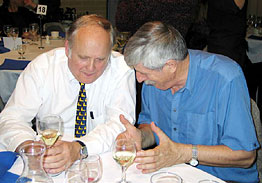UCMP co-sponsors symposium on Mollusca evolution(page 1 of 2) |
||
|
On July 11th 2004, over 300 biologists and paleontologists from more than 40
countries gathered in Perth, Australia for the World Congress of Malacology.
Malacology is the study of molluscs (e.g., snails, clams, squid and octopus)
and focuses on understanding one of the most diverse groups of organisms on
earth. There are over 200,000 living species of molluscs and they range in
size from giant squids over 20 meters in length to adult snails with body
sizes of less than half a millimeter. They also exhibit a great variety of
physiological, behavioral, and ecological adaptations and habitats, and have
an excellent fossil record extending back some 560 million years. With so
many lineages over such deep time, it is hard to imagine any topical biological
or paleontological question that cannot be addressed with a molluscan exemplar
or system, and the papers and posters at Perth did little to negate this
assumption. |
 The symposium organizers, David Lindberg (left) and Winston Ponder, kick back after a successful meeting (photo by Julie Ponder) brought together a remarkable group of scientists to present and discuss current hypotheses on the relationships and evolutionary history of the Mollusca. The three-day symposium featured 38 presentations and nine posters. Speakers were intentionally selected both to complement and to contrast different viewpoints, datasets, and methodologies. The organizers were not looking for consensus, but rather a critical review and status report of our understanding of the evolutionary history of this major branch on the Tree of Life.
|
|